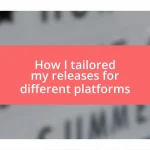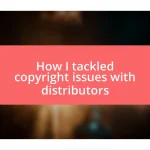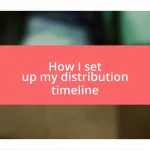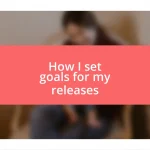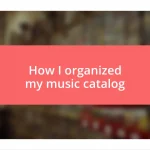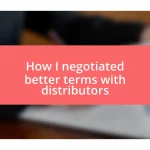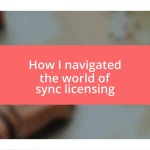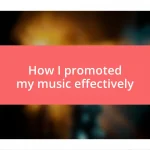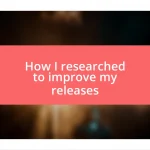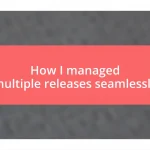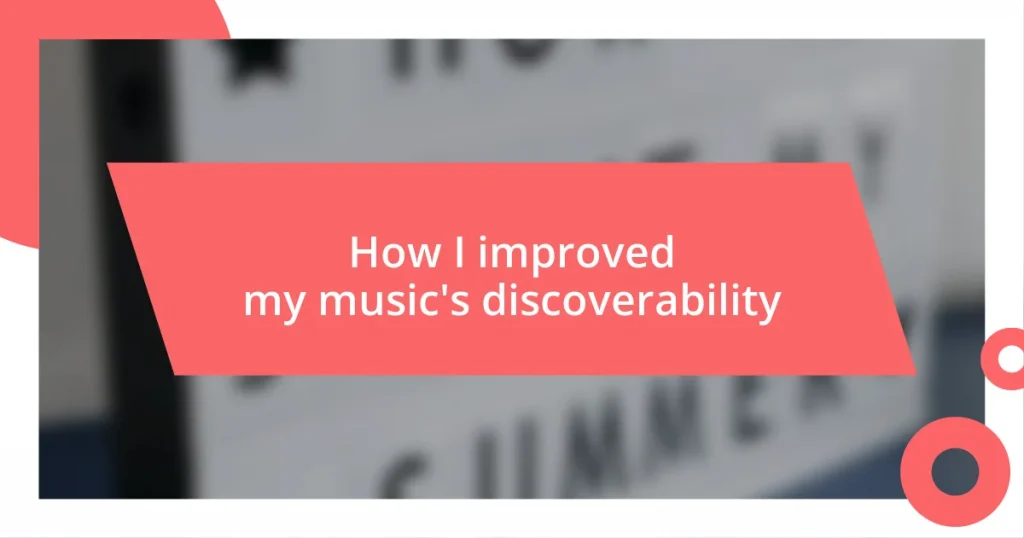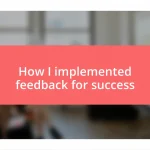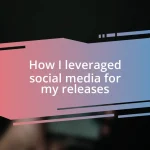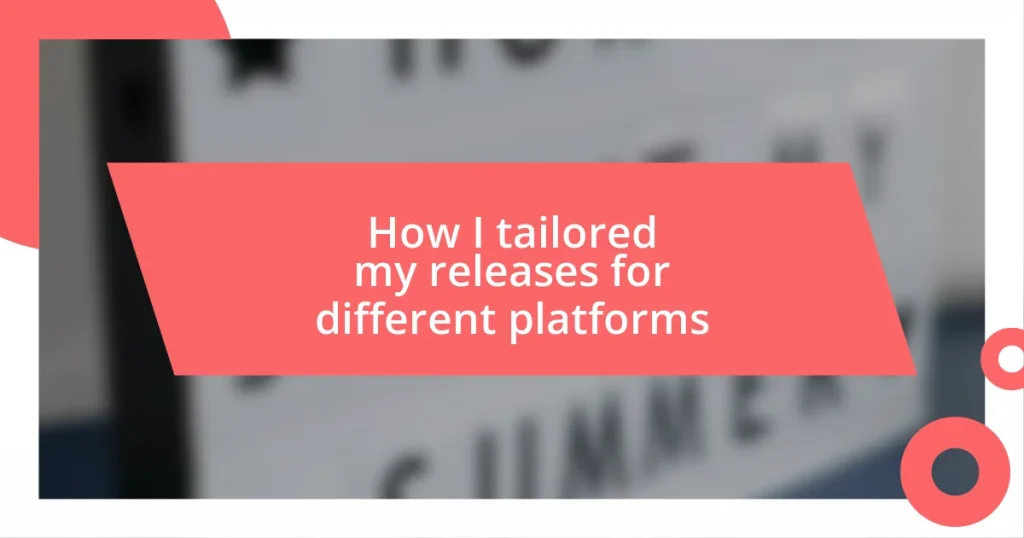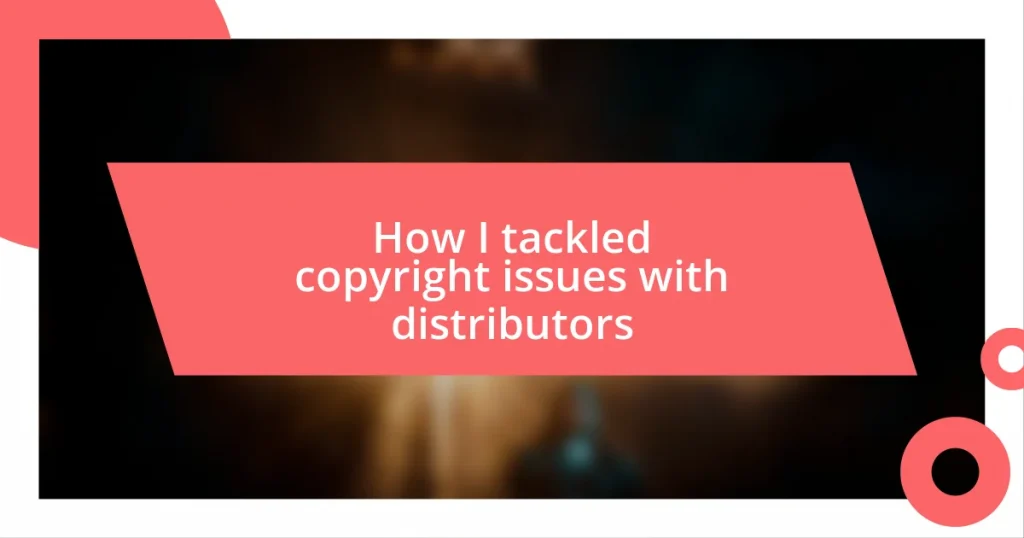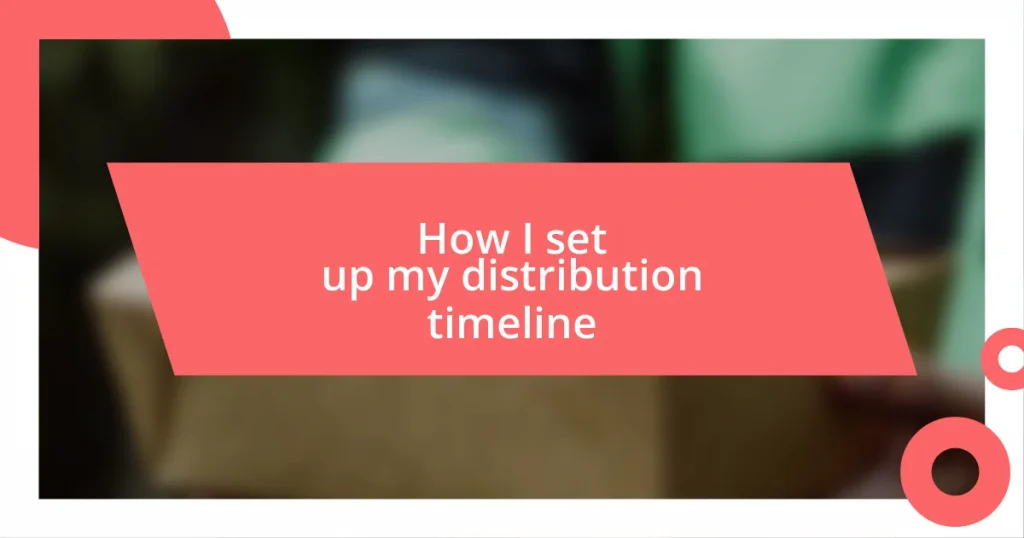Key takeaways:
- Music discoverability relies on meaningful connections with listeners, engaging with playlists, and understanding emotional elements that attract audiences.
- Effective music promotion is essential for visibility, building community, and creating growth opportunities, resulting in increased listener engagement and collaborations.
- Leveraging social media and analyzing feedback are crucial strategies for enhancing audience engagement, improving music reach, and tailoring promotional efforts based on listener preferences.
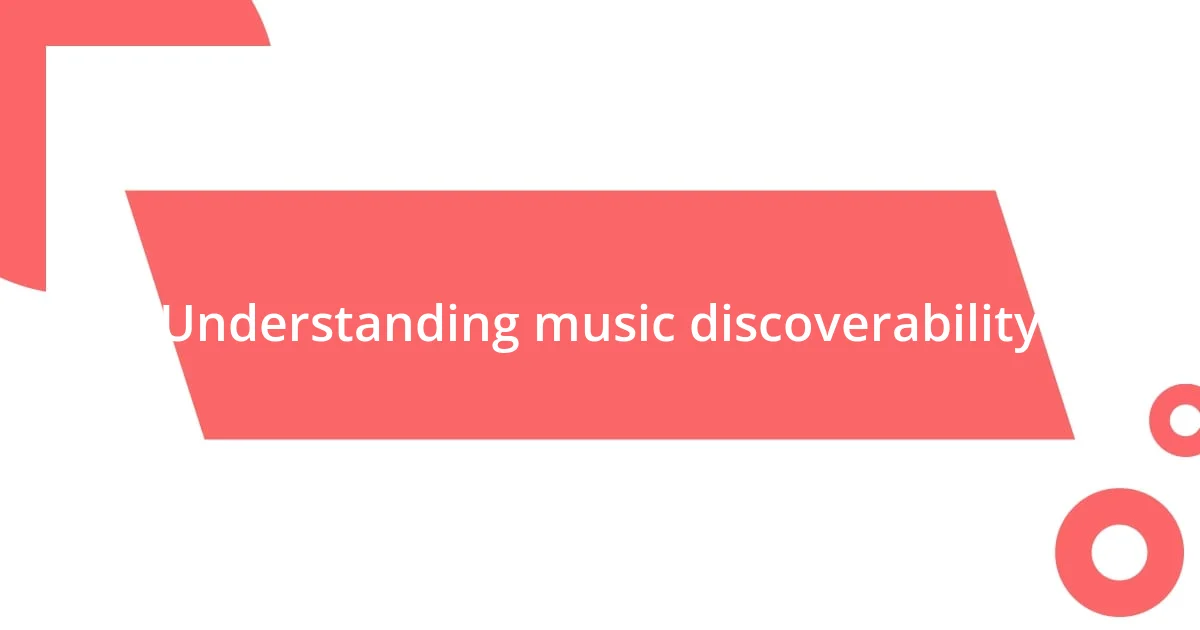
Understanding music discoverability
Understanding music discoverability goes beyond just getting your tracks onto platforms; it’s about connecting with listeners in a meaningful way. I remember the frustration of pouring my heart into an album, only to feel as if it vanished into the vast digital ocean. Have you ever felt that your music was out there, but somehow invisible? It’s a common struggle that many artists face.
In my experience, discoverability hinges on how well you position your music within the ever-evolving landscape of streaming services and social media. When I started actively engaging with playlists and curators, I felt a tangible shift in my audience. It’s fascinating how a single shared playlist can expose you to new listeners who resonate with your sound.
The emotional aspect of discoverability is just as crucial. Each new follower or listener feels like a validation of my creative journey. I often ask myself, what draws people to my music? Is it the melody, the lyrics, or perhaps the story behind the song? Understanding these elements can make the difference between being a hidden gem and a must-listen artist.
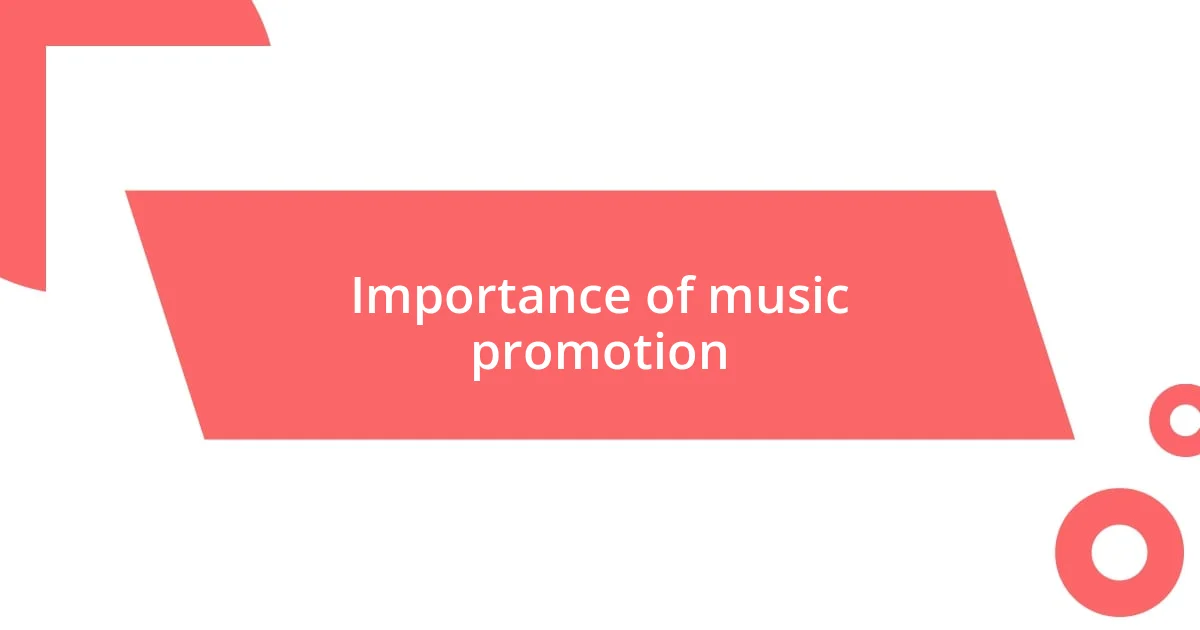
Importance of music promotion
When I first plunged into the world of music promotion, I quickly realized that simply releasing a track wasn’t enough. Think of it like throwing a beautiful stone into a vast ocean; if you don’t make ripples, nobody will notice it. Promotion is the lifeline that connects artists to listeners, amplifying that moment of connection that makes music so powerful. It’s about building momentum and creating a buzz that intrigues both fans and industry professionals.
Key reasons why music promotion is crucial:
- Visibility: It places your music in front of a broader audience, increasing the chances of discovery.
- Connection: Engaging with listeners fosters a sense of community and loyalty.
- Opportunities: Promoted music can attract attention from venues, brands, and other artists for collaborations.
- Feedback: Promotion allows you to receive valuable insights and reactions from your audience.
- Growth: Sustained promotion can lead to growth in followers, plays, and overall engagement with your work.
I remember the rush of seeing my single featured on a respected playlist; it felt like being handed a golden ticket. That placement didn’t just boost my streams; it introduced me to a whole new audience who genuinely connected with my message and sound.
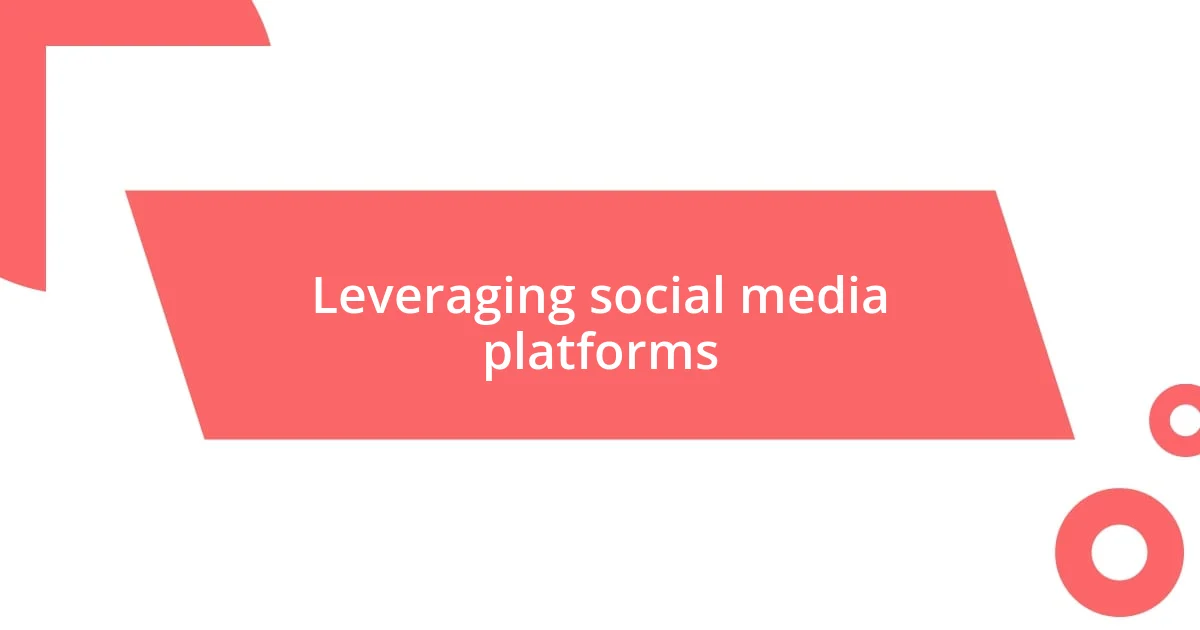
Leveraging social media platforms
Social media platforms have become an essential tool for musicians looking to enhance their discoverability. When I began sharing my music journey on platforms like Instagram and TikTok, I saw a shift in how listeners engaged with my work. It was eye-opening to discover that authenticity resonates deeply; sharing not only my music but also my experiences created a genuine connection with my audience. Have you ever noticed how people gravitate towards vulnerability? That’s the magic of storytelling in music promotion.
I found that each platform offers unique ways to reach listeners. For instance, TikTok’s short-form video format allows for creative snippets of my music, encouraging users to create their own interpretations. This has led to some of my songs going viral in ways I could not have imagined. On the other hand, Instagram has been my canvas for visuals, where I post behind-the-scenes content that allows fans to feel part of my journey. It’s thrilling to see how these different approaches yield organic engagement from diverse audiences.
Moreover, interacting with followers directly has been profound for my growth as an artist. I often host Q&A sessions or share live performances, creating real-time conversations about my inspirations and creative processes. Just last week, a follower shared how a particular song helped her through a tough time. That moment reminded me why I make music—it’s all about connection. In essence, leveraging social media isn’t just a marketing strategy; it’s an emotional bridge to the listeners who help shape my musical narrative.
| Platform | Strengths |
|---|---|
| Visual storytelling and audience engagement. | |
| TikTok | Viral challenges and creative shorts that can spark trends. |
| Real-time interaction and updates that foster community. | |
| Group interactions and event promotions for a localized audience. |
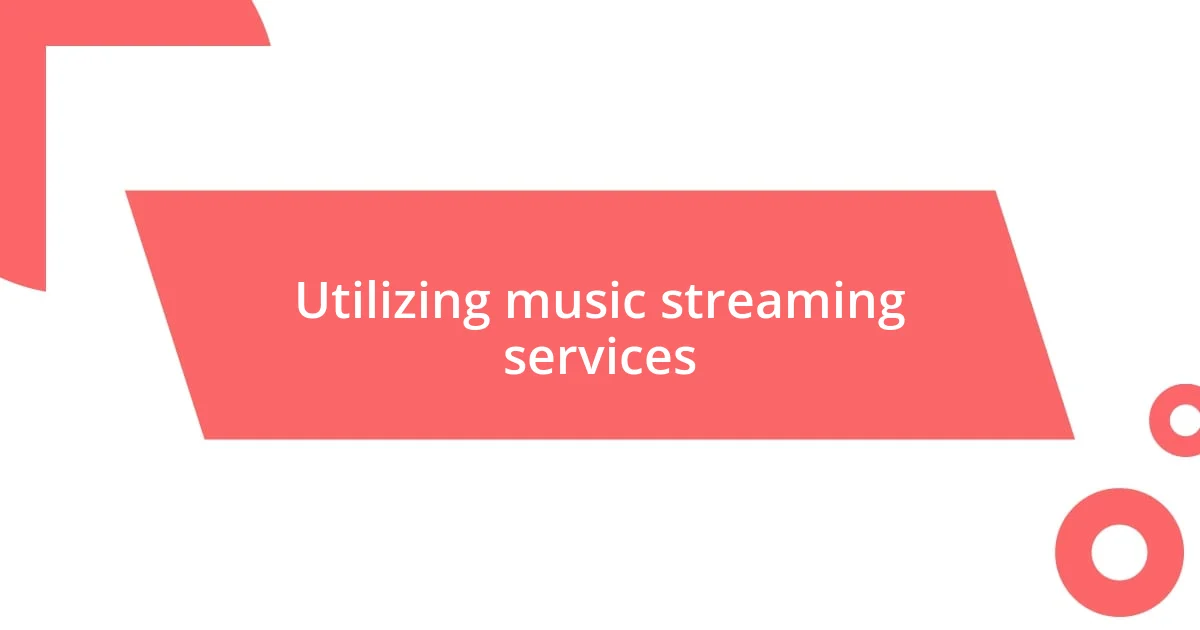
Utilizing music streaming services
Streaming services are a game changer for musicians today. I still recall the thrill of releasing an EP on platforms like Spotify and Apple Music. The first time I saw that “first listen” notification felt surreal; that instant connection with listeners across the globe ignited a sense of purpose in my artistry. But it wasn’t merely about uploading tracks; I learned to curate playlists and collaborate with other artists to reach wider audiences. Have you ever considered how impactful a well-placed feature can be for an emerging artist? It’s like opening a door to new rooms in a mansion you didn’t even know existed.
Additionally, I found that utilizing various tools offered by these services can significantly elevate one’s discoverability. One strategic move I made was creating engaging visuals for my tracks, which streamed directly onto platforms. I remember crafting a simple yet captivating cover that resonated with my audience; it was mesmerizing to witness how a carefully thought-out image could provoke curiosity and encourage clicks. Fun fact: I also started exploring “Release Radar” and “Discover Weekly” playlists, and landing on those felt like striking gold! Suddenly, my music was being introduced to people who had never heard of me before, and the feedback was incredibly encouraging.
Moreover, don’t underestimate the power of analytics provided by these streaming platforms. I dove into the data, seeing which tracks resonated most with listeners. This insight allowed me to tailor my creative process and marketing strategies effectively. It was fascinating to see how tracks I considered “just for fun” suddenly gained traction, reinforcing the idea that you never truly know what will connect with people. Have you ever analyzed your own music’s analytics? Understanding your audience’s preferences could be the key to unlocking long-term growth in your musical journey.
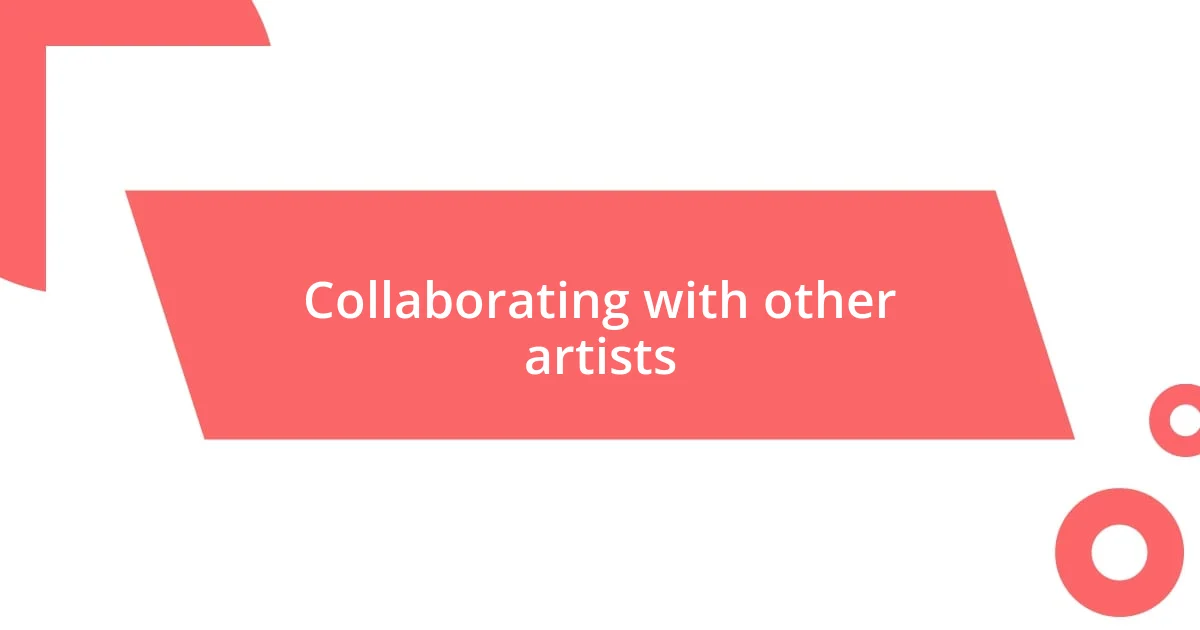
Collaborating with other artists
Collaborating with other artists has been a transformative experience for me. I remember my first collaboration with a singer-songwriter I met at an open mic night; I was nervous but excited. The synergy we created was electric, and it opened doors I hadn’t even considered. Have you ever felt that thrill when two creative minds come together? It’s an indescribable rush that can elevate your music to new heights.
Working with different musicians brings diverse perspectives and styles into your music. I partnered with a beatmaker who introduced me to electronic elements that I had never explored. The fusion of our styles not only enriched my tracks but also attracted listeners from his fan base. I often wonder: how many artists are out there, waiting to find a harmony with someone like you? It’s a reminder that collaboration expands our reach and fosters a sense of community in the music scene.
Moreover, promoting the collaboration itself can amplify both artists’ visibility. When our track launched, we combined our social media efforts, sharing snippets and behind-the-scenes moments that created buzz. I still smile when thinking about how my friend and I laughed during our recording sessions—those genuine moments resonate with fans. Collaborating not only broadens our musical horizons but also creates lasting memories and connections that enrich our artistic journeys. Have you explored collaborative opportunities? They might just be the missing piece in your music puzzle.
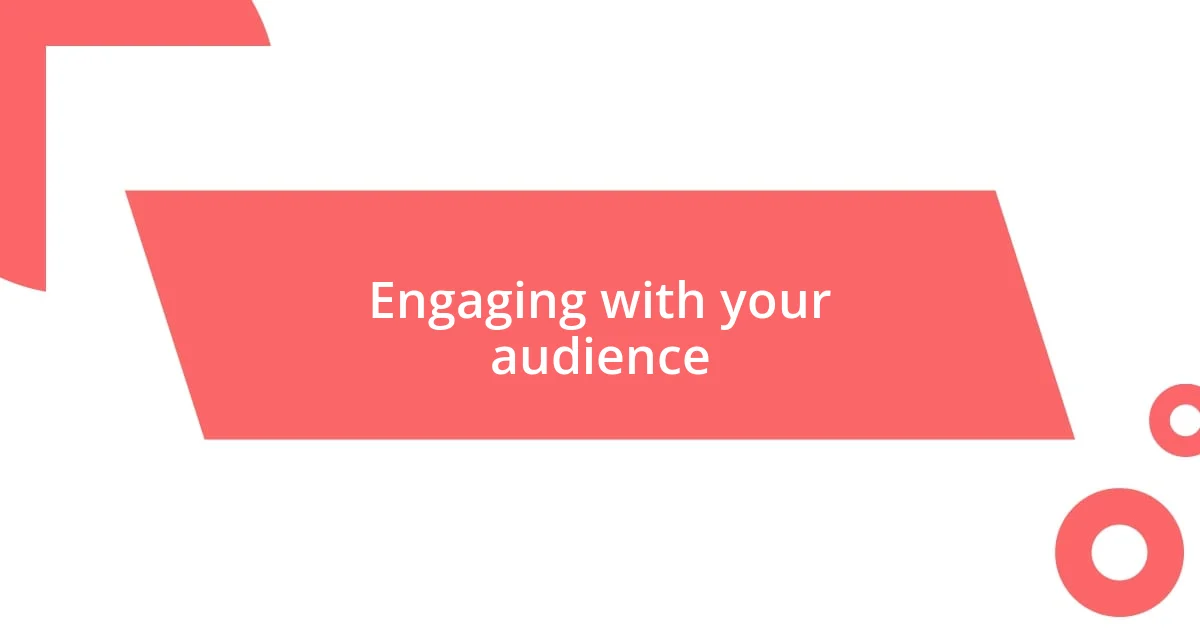
Engaging with your audience
Engaging with your audience has been a pivotal aspect of my musical journey. I remember the initial excitement of sharing a new track on social media and the flood of comments and shares from my followers. It felt incredible to witness their enthusiasm firsthand. How often do you take a moment to interact with your listeners? Those small exchanges can build a sense of community that fuels your creativity and inspires your next project.
One of the most effective strategies I discovered was hosting live Q&A sessions on platforms like Instagram Live. The first time I did this, my heart raced with anticipation. Fans asked questions about my songwriting process, and I was able to share stories behind specific songs. This interaction not only deepened my connection with my audience but also gave them a glimpse into my creative world. I found it fascinating how real-time engagement sparked conversations that went beyond surface-level fandom. Have you ever thought about inviting your fans into your creative space?
Additionally, I embraced the idea of sending out personalized messages to my most dedicated followers. It was initially daunting, but when I received heartfelt responses from listeners who felt truly seen, it was rewarding. Those simple gestures—saying “thank you” or sharing a song recommendation based on their tastes—fostered loyalty among my audience. It also made me realize that engaging with them isn’t just about promotion; it’s about building genuine relationships. How might interacting on a personal level change your approach to connecting with your listeners?
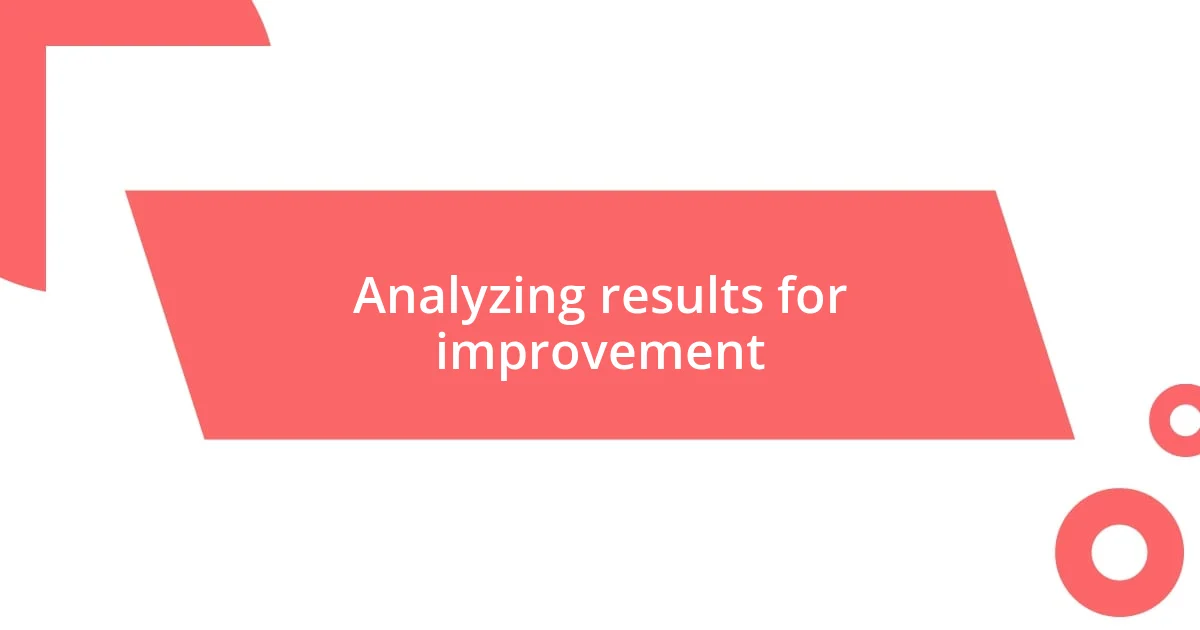
Analyzing results for improvement
Analyzing the results of my music’s discoverability journey has been both enlightening and crucial for improvement. After every release, I take the time to dive into the analytics. I remember when I noticed that a particular track performed exceptionally well in specific demographics. It was a revelation that made me ask—what was it about that song that resonated so strongly with listeners? Understanding these patterns can guide your future projects.
I’ve also learned to appreciate listener feedback, often portrayed in comments or social media interactions. I recall the day I received a message from a fan who shared how one of my lyrics deeply connected with their personal struggle. That moment reinforced the importance of paying attention to the emotional impact my music has on others. Have you considered how listener sentiments can inform your artistic direction?
Finally, I regularly adjust my strategy based on the insights gathered from engagement metrics. For instance, I experimented with different release times and found that dropping new songs in the evening garnered more attention. This led me to wonder—are there unexplored avenues in your own promotional strategy that could enhance visibility? Analyzing results isn’t just about numbers; it’s about understanding the heartbeat of your audience and adapting accordingly.
